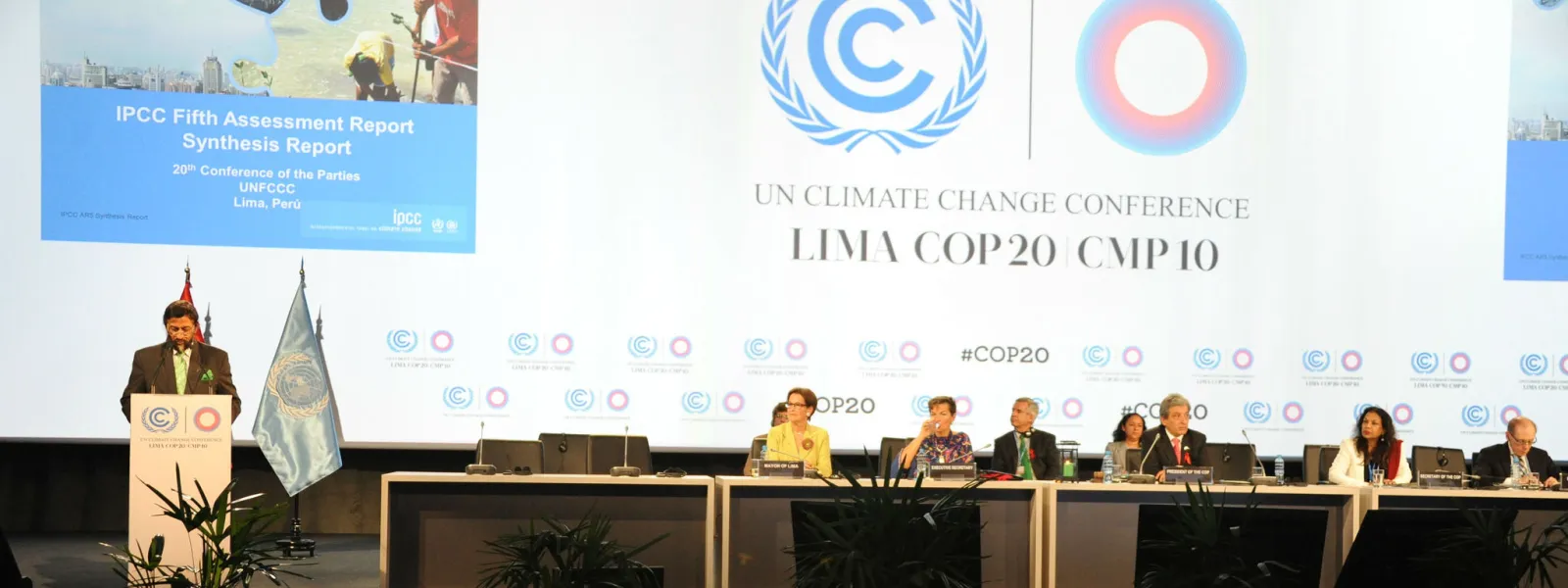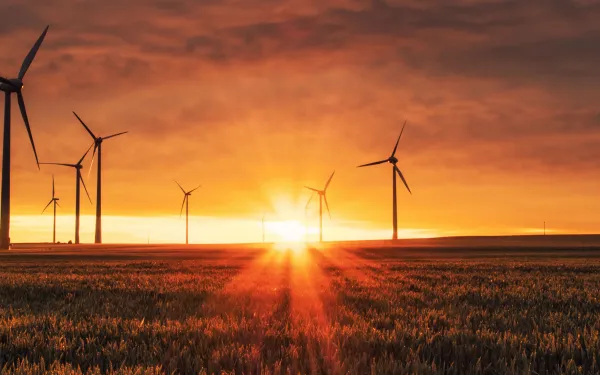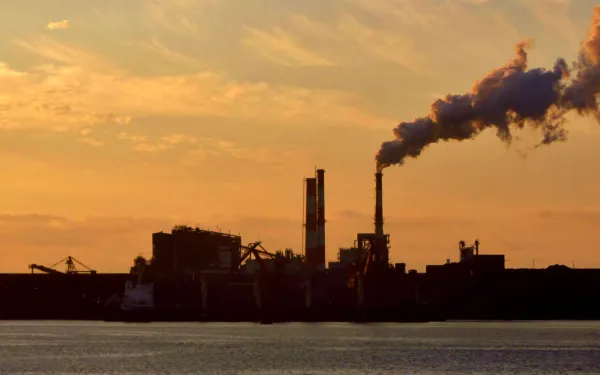
Project
Photo: UNFCCCMonitoring the UN Climate Negotiations
As changes in climate become more extreme, their affects are being hardest felt throughout developing countries. Since 1994, the United Nations Framework Convention on Climate Change has laid out actions to limit the increase of global average temperatures and confront the impacts of climate change.
The States that are Parties to the Convention meet every year in the so-called Conference of the Parties (COP) to review their commitments, the progress made in fulfilling them, and pending challenges in the global fight against the climate crisis.
At COP21 in 2015, they adopted the Paris Agreement, which seeks to strengthen the global response to the climate emergency, establishing a common framework for all countries to work on the basis of their capacities and through the presentation of Nationally Determined Contributions (NDC) that will:
- Limit the increase in global temperatures to 2°C compared to pre-industrial levels and continue efforts to limit it to 1.5°C;
- Increase the capacity of countries to adapt to the impacts of climate change; and
- Ensure that financing responds to the goal of reducing greenhouse gas emissions.
Our focus areas
THE CLIMATE CRISIS AND HUMAN RIGHTS
The climate crisis, due to its transversal character, has repercussions in various fields, geographies, contexts and people. In this regard, the Preamble to the Paris Agreement states that it is the obligation of States to "respect, promote and fulfill their respective obligations on human rights, the right to health, the rights of indigenous peoples, local communities, migrants, children, persons with disabilities and people in vulnerable situations and the right to development, as well as gender equality, the empowerment of women and intergenerational equity."
AIDA at the COP
COP25: Chile-Madrid 2019
At COP25 in Madrid, Spain, we advocated for the inclusion of the human rights perspective in various agenda items. We promoted the incorporation of broad socio-environmental safeguards in the regulation of Article 6 of the Paris Agreement, which refers to carbon markets. We closely followed the adoption of the Gender Action Plan, as well as the Santiago Network, created "to catalyze technical assistance […] in developing countries that are particularly vulnerable to the adverse affects of climate change." We also encouraged the inclusion of ambitious and measurable targets for the reduction of short-lived climate pollutants in the climate commitments of States.
Related projects
Latest News

Six measures to ensure our actions achieve climate justice
On December 2, the twenty-fifth Conference of the Parties (COP25) to the United Nations Framework Convention on Climate Change opened in Madrid. It’s a vital meeting for the planet, during which governments must drastically increase their ambitions and climate commitments if we hope to preserve life, as we know it today. So far, there have been more announcements than actions. That’s why I’d like to highlight six measures that will help us move towards the results the planet needs. The outlook is not encouraging. Change remains urgent. Every day, the climate crisis causes greater harm, particularly for the most vulnerable among us. According to the United Nations Emissions Gap report, emissions continue to rise and current actions are insufficient to achieving the necessary reductions. In an evident political and financial weakening, nations that once led climate actions are now withdrawing or refusing to comply with the agreements. Added to this are emerging social protests, particularly in Latin America. The governments of Ecuador, Chile and Colombia have declared curfews in recent weeks to deal with the serious situations in their countries; COP25 was moved from Santiago de Chile to Madrid. In some instances, abuse of force caused several deaths and hundreds of other injuries. All this demonstrates the urgency of heeding the social call, of acknowledging and dealing with inequality, of finding solutions and building countries where all have a place. One thing is clear: we’ve been moving in the wrong direction and we must change course. We need profound changes in energy, transportation and food systems, as well as in the negotiation, decision-making and implementation of climate actions. This is essential if we are to arrive at peak global emissions as soon as possible, cut them in half by 2030, and reach zero emissions by 2050. Significant efforts are undoubtedly being made. There are billion-dollar investments by governments, businesses, organizations and individuals. But it’s not enough. We must stop and assess what is serving us and what is not; what we should continue to do and what we must do differently. These six measures could make climate action more effective and help us achieve climate justice: 1. Include human rights as a transversal element (seriously). Although it’s been a petition of social movements, indigenous peoples and organizations for decades, official recognition of human rights has yet to materialize. Responding to this call is vital to increasing the ambition and responsibility that is so needed. While the Cancun and Paris Agreements refer to the importance of respecting human rights, their implementation has failed to include this perspective. This, despite the fact that human rights bodies have reminded States of their obligation to do so; and IPCC scientists have highlighted the importance of addressing social inequality and including the wisdom of indigenous communities as a fundamental element in resolving the climate crisis. 2. Ensure the effective participation of affected people and communities in the planning, discussion, decision-making and monitoring of climate actions. Indigenous peoples, rural communities, Afro-descendants, and youth are among the groups most affected by the climate crisis. In addition, local communities have protected millions of hectares of forests and other natural areas, essential for climate resilience. Yet spaces for the participation for these actors remain scarce and spaces for decision-making, in COPs and other instances, are almost non-existent. Ensuring that discussions and decisions are truly diverse is an essential step towards increasing climate ambition and effectiveness. Communities should be considered subjects of rights, not simply objects of protection projects and actions. 3. Secure the equitable distribution of funds We live in the midst of immense inequality, where wealth, property and privileges belong to a few, while the majority assume the negative impacts. The climate crisis is partly a result of this situation. Although Latin America is the most unequal region on the planet, inequality is underestimated, according to ECLAC. That’s why the distribution of economic and human resources must address this reality, ensuring that the Global South has access to opportunities to participate on equal footing towards true climate justice. This would increase the possibility of finding alternative solutions and replicating those already in place. 4. Hold accountable those responsible for the climate crisis Those causing the climate crisis should be held accountable for it, instead of attacking those who seek accountability and climate justice. This is one of the great obstacles to moving forward. It’s time to name those responsible and demand that they take charge and repair the damages, rather than accepting false solutions and ineffective voluntary actions. 5. Incorporate a feminine perspective, based in maternal love By this I mean the need to rescue a perspective of collaboration and serious dialogue in order to reach consensus, assuming responsibilities over differences and competition. Let us include a perspective that prioritizes the care of the Earth, of nature and of people. Let's stop putting economic interests and short-term vision above the health of our planet. Let's focus our efforts on agreeing how we can achieve climate justice, coming out of denial, and leaving behind excuses about why it can't be done. 6. Acknowledge the true costs of the climate crisis: social, economic, environmental and human. So far most economic assessments have focused on calculating the costs of the transition to a zero-emission economy. While there are estimates of the costs involved in not implementing the transition, these ignore the social, environmental and cultural impacts. This is particularly significant for regions such as Latin America, which, in addition to suffering human and cultural losses, are losing their natural wealth. Scientists have concluded that the changes will be more costly the longer they take to be implemented. COP25 could be an opportunity to incorporate these and many other measures in the battle against the climate emergency. At this point, insisting on the same thing will only bring more frustration and failures. Not taking action will condemn millions more people to suffer the consequences of the climate crisis, and of inadequate solutions that violate their rights. The reality is indisputable, which makes it imperative to include human rights as the crosscutting axis of our climate actions. If we do not, the actions resulting from the Conference of the Parties will resemble the emperor of the Brothers Grimm’s story. They will come out to the parade naked, proudly wearing a costly suit made with climate ambition, yet insufficient for what the planet needs. We must instead cover climate actions with a suit of climate justice—a visible one that we must weave together. We have no time to spare.
Read more
Sacrifice Zones: The injustice of living in an unhealthy environment
Forty percent of the energy produced and consumed in Chile comes from burning coal. Just 28 thermoelectric plants, concentrated in five locations across the country, generate that enormous amount of energy. In these so-called Sacrifice Zones, inhabitants live immersed in pollution. The result is severe health damages, children with learning disabilities, and poisoned seas. The serious detriment of living in one of these areas has been amply documented. A recent report from the Catholic University of Chile, commissioned by the NGO Sustainable Chile, shows that living in a Sacrifice Zone translates into greater risks of illness and premature death. The country’s current social unrest represents a historic opportunity for transformation. Pushed by the voice of its people, and in the Presidency of this year’s international climate negotiations, Chile can lead a structural change focused on the redistribution of burdens and benefits, both social and environmental. The result would be a cleaner and fairer country. The road to decarbonization In June, after a year of discussions with industry and other stakeholders, President Sebastian Piñera announced a schedule for the decarbonization of Chile. In the agreement, industry leaders pledged to close all coal-fired power plants by 2040. As positive as it may seem, an in-depth analysis of the proposal leads to the conclusion that the government’s goal is not ambitious enough to achieve the prompt justice that affected communities deserve. The timetable sets the nation’s eight oldest plants up for the closure by 2024, but fails to give dates or details on the closure of the remaining 20 plants, leaving it to the goodwill of future administrations. Under those terms, there is no way to guarantee that the plan will be implemented. Moreover, waiting 20 more years is not an acceptable deal for those who have already carried too much of the burden for far too long. Nor is it a move toward maintaining our planet’s climate equilibrium, a battle in which we have no time to spare. Another criticism of the government's proposal is that shortly after it was announced, the energy company Engie inaugurated a new coal-fired power plant in Mejillones, a Sacrifice Zone in the north of the country. The new plant has more than double the operating capacity of two thermoelectric plants in Tocopilla, which the same company would have closed after signing the decarbonization plan. But it's not all bad news. A month before social protests broke out in Chile, the government signaled a more ambitious decarbonization goal. In September, the Chamber of Deputies approved an initiative asking the President to move the closure of coal-fired power plants up by ten years, to 2030. The request is based on a study commissioned by the NGO Sustainable Chile and completed by the consulting firm Kas Engineers. Their research shows the technical and economic feasibility of reaching decarbonization by 2030. Chile’s current social crisis erupted in the midst of the search for a binding agreement to achieve decarbonization. Social unrest in Chile Chile is in the midst of a historic moment. Social discontent—generated by the injustices, inequality and lack of equity endured for years by the most vulnerable segments of the population—triggered ongoing protests, which have yet to abate. What’s happening in Chile is a mirror of what could happen in many countries of the world, particularly in Latin America. The metaphorical grass is dry and any spark could surely ignite social mobilization, uncovering chambers that have for years accumulated injustice and discontent. The figures confirm that Chile has grown and there is less poverty, but neither the benefits nor the burdens have been equitably distributed. Authorities have failed. Confidence is running out and disillusionment is increasing. The Sacrifice Zones are a very clear example of the structural problems afflicting our society: certain communities bear all the costs and enjoy none of the benefits. This is unacceptable. A new direction is possible Fires, floods and other extreme weather events, which uproot people’s lives, show us that nature will not stop protesting until we respect her. Society is also calling for respect, with an urgency that has gained the attention of decision-makers. Changes that once seemed impossible are within reach. It’s not that social demands are more important than environmental demands, or vice versa. Environmental demands are also social demands. Although the climate crisis and pollution affect us all, the damage is much greater for the most vulnerable populations. Changes that favor our planet can and must be made with a social justice perspective, and in harmony with nature. In the case of Chile, decarbonization—and with it, an end to Sacrifice Zones—is the change that will make us a better country. Because one of life’s greatest injustices is being forced to live in an unhealthy environment.
Read more
Air pollution: it damages your health from day one
Although they occur seasonally each year, respiratory diseases are becoming increasingly severe, said pediatrician Gina Pinilla, who works in Bogotá. As air quality decreases, health complications increase for children who come to the emergency department. What Dr. Pinilla has observed in more than a decade of experience as a doctor is no mere impression. A study conducted by a multidisciplinary team of researchers in Colombia shows that health damage from poor air quality is noticeable from day one. Hospital admissions increase over the first 24 to 72 hours and can extend for almost two weeks. It’s the first multi-city study conducted in Colombia and Latin America to determine the relationship between air pollution and respiratory and circulatory diseases in the population, explained lead researcher Dr. Laura Rodriguez of the Industrial University of Santander. Each contaminant affects us differently One of the findings that most caught the researchers' attention is that harms caused by pollutants are different for children and adults. Children suffer from respiratory diseases, while adults face cardiovascular complications. "Children between 5 and 9 years old face greater impacts and are more likely to have an episode that takes them to the emergency room,” explained Dr. Rodriguez. “But this doesn't mean that the younger ones are unaffected. When a child has respiratory complications, he or she may stay hospitalized for up to a week and be connected to respiratory support. "There are children who need prolonged hospitalizations. For a week, they are dependent on oxygen, whether from a nasal cannula or oxygen machines,” Dr. Pinilla added. “Then they are left with side effects and get sick often." The particular mixture of pollutants found in the air also affects each age group differently. "Pollution in every city has its own behavior: interaction, quantity and the change in makeup between cities," said Dr. Rodriguez. In Bogotá, for example, pollution by sulfur dioxide and particulate matter (PM10 and PM2.5) are related to circulatory diseases in people over 60. Pollution by nitrogen dioxide, sulfur dioxide and PM2.5 particles significantly increases the risk of hospitalization in people under the age of 15. The researcher says that the damage caused by nitrogen dioxide is not given much importance, despite being associated with cardiovascular disease in adults. And, when that pollutant is combined with sulfur dioxide and particulate matter, its effects are enhanced. Pollution harms, even in small quantities An important takeaway from this study is that contaminants can begin to damage public health even before they reach maximum allowable limits. Nitrogen dioxide, for example, is considered harmful, yet regulations have set very high emission limits. "Reaching these limits is very difficult. The city has to be in absurdly high pollution for the alerts to sound," explained Dr. Rodriguez. “The health effects are not related to whether you are exposed to the limits or not, but to the type of mixture you are breathing, because the pollutants are potentiating each other.” In several Latin American cities, regulations allow pollution limits that exceed the recommendations of the World Health Organization (WHO). For example, the WHO recommends a maximum average of 20 µg/m3 (micrograms per cubic meter) of PM10 (solid particles such as ash, soot and dust), but Bogotá has an average of 38 µg/m3. Other cities in the region have even higher annual averages: 40 (Monterrey), 55 (Mexico City), 62 (Lima) and 69 (Santiago). What does this information mean for your city? When poor air quality reaches its most critical levels, hospitals are left without beds and many children with respiratory illnesses remain in the emergency area, explained Dr. Pinilla. It's a common situation because there are no action plans for environmental contingencies. For Dr. Laura Rodriguez, the most important result of her research would be that it helps institutions take action to confront the issue. She recommends local governments and health institutions: Control and regulate the air quality parameters of industrial emissions, and consider monitoring other pollutants. Increase efforts to communicate to the public about the risks of pollution levels in their cities. Prepare hospitals, especially in the first months of the year when pollution reaches its highest level, aggravated by changes in the climate. She emphasized the importance of making intersectoral and multidisciplinary plans and investigations to understand the panorama of air pollution, and to ensure that this information gets into the hands of the appropriate authorities. The study was also conducted by Julián Alfredo Fernández-Niño (U. del Norte, Barranquilla), Néstor Rojas (U. Nacional), Luis Camilo Blanco (U. Santo Tomás) and Víctor Herrera, U. Autónoma de Bucaramanga). Consult it here.
Read more